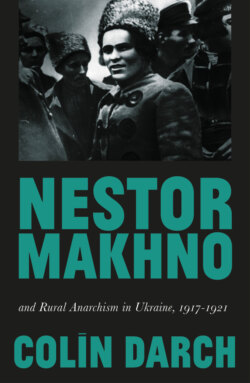Nestor Makhno and Rural Anarchism in Ukraine, 1917-1921

Реклама. ООО «ЛитРес», ИНН: 7719571260.
Оглавление
Colin Darch. Nestor Makhno and Rural Anarchism in Ukraine, 1917-1921
Nestor Makhno and Rural Anarchism in Ukraine, 1917–21
Contents
Maps
Abbreviations
Acknowledgements
1. The Deep Roots of Rural Discontent: Guliaipole, 1905–17
2. The Turning Point: Organising Resistance to the German Invasion, 1918
3. Brigade Commander and Partisan: Makhno’s Campaigns against Denikin, January–May 1919
4. Betrayal in the Heat of Battle? The Red–Black Alliance Falls Apart, May–September 1919
5. The Long March West and the Battle at Peregonovka
6. Red versus White, Red versus Green: The Bolsheviks Assert Control
7. The Last Act: Alliance at Starobel’sk, Wrangel’s Defeat, and Betrayal at Perekop
8. The Bitter Politics of the Long Exile: Romania, Poland, Germany, and France, 1921–34
9. Why Anarchism? Why Ukraine? Contextualising Makhnovshchina
Epilogue. The Reframing of Makhno for the Twenty-First Century
Notes. CHAPTER 1 THE DEEP ROOTS OF RURAL DISCONTENT: GULIAIPOLE, 1905–17
CHAPTER 2 THE TURNING POINT: ORGANISING RESISTANCE TO THE GERMAN INVASION, 1918
CHAPTER 3 BRIGADE COMMANDER AND PARTISAN: MAKHNO’S CAMPAIGNS AGAINST DENIKIN, JANUARY–MAY 1919
CHAPTER 4 BETRAYAL IN THE HEAT OF BATTLE? THE RED–BLACK ALLIANCE FALLS APART, MAY–SEPTEMBER 1919
CHAPTER 5 THE LONG MARCH WEST AND THE BATTLE AT PEREGONOVKA
CHAPTER 6 RED VERSUS WHITE, RED VERSUS GREEN: THE BOLSHEVIKS ASSERT CONTROL
CHAPTER 7 THE LAST ACT: ALLIANCE AT STAROBEL’SK, WRANGEL’S DEFEAT, AND BETRAYAL AT PEREKOP
CHAPTER 8 THE BITTER POLITICS OF THE LONG EXILE: ROMANIA, POLAND, GERMANY, AND FRANCE, 1921–34
CHAPTER 9 WHY ANARCHISM? WHY UKRAINE? CONTEXTUALISING MAKHNOVSHCHINA
EPILOGUE: THE REFRAMING OF MAKHNO FOR THE TWENTY-FIRST CENTURY
Index
Отрывок из книги
Nestor Makhno and Rural Anarchism in Ukraine, 1917–21
Historia scribitur ad narrandum, non ad probandum – Quintilian
.....
The February revolution – the abdication of the Tsar and the coming to power of Kerensky’s Provisional Government in Moscow – had released the pent-up energy of the Ukrainian masses. Makhno was returning to a country that was undergoing a massive realignment of forces. In late March a group of intellectuals led by Mykhailo Hrushevs’kyi99 formed the Ukrains’ka Tsentral’na Rada (Ukrainian Central Council). Its initial, modest objectives were to coordinate the national movement and to demand from the Provisional Government the right to print books and newspapers in Ukrainian and to teach it in schools.100 It later supported the idea of a federal framework (while more radical left parties, including the communists, worked for revolutionary transformation). However, with the Rada’s unilateral declaration of Ukrainian autonomy in June 1917, ‘the genie’ in Plokhy’s words ‘was out of the bottle’.101
In Guliaipole, some of Makhno’s old comrades had survived, but there were many faces that he did not know.102 He decided that he was not going to miss an opportunity to help create, as he put it, ‘…the means whereby to do away with the old regime of slavery and to conjure up a new one wherein slavery would not exist and wherein authority would have no place’.103 Police persecution had decimated the original anarchist group, but the handful of remaining members had reconstituted themselves as a new organisation in May 1916, and Makhno’s return saved the group from collapse.104 He frequently spoke at rallies, helped to print leaflets and organise public demonstrations, and agitated for ‘Free Soviets’ and for the non-recognition of Kerensky’s government.105
.....